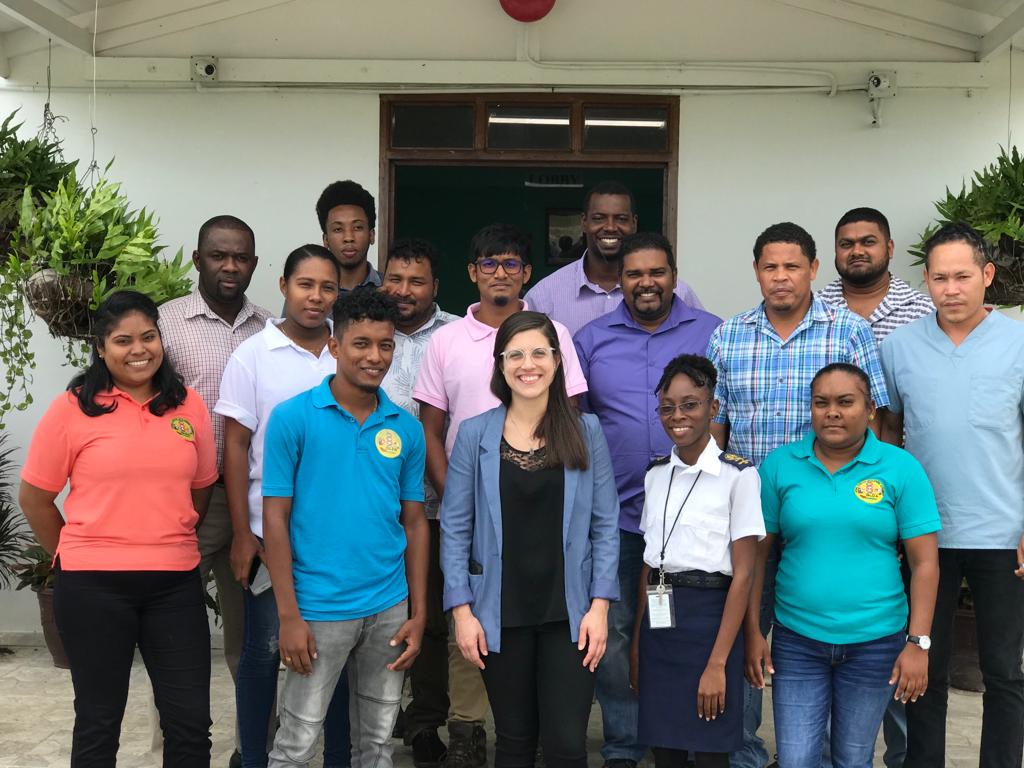News
Farmer-to-Farmer Supports Sustainable Livestock Systems in Jamaica and Guyana
| Partners of the Americas

Livestock is a critical part of sustainable agriculture that international development projects must address to advance livelihoods globally while simultaneously protecting Earth’s precious natural resources. Since 1991, Partners of the Americas (POA) has worked on the USAID-funded Farmer-to-Farmer Program (F2F), which aims to improve the sustainable use of natural resources through direct technical assistance. F2F thrives because it is able to connect people with people- U.S. agricultural professionals (serving as F2F volunteers) collaborate with farmers and agriculture sector stakeholders in developing countries. In recent years, POA has made significant strides in Guyana and Jamaica, providing climate-smart technical assistance to support sustainable livestock systems.
Guyana
Guyana is particularly vulnerable to extreme weather events and changing climate patterns. Scientific data indicate that rising temperatures are leading to heat stress, severe water deficits, and increased pest and disease pressure that all negatively affect the livestock sector. F2F volunteers address these challenges by training farmers and agriculture sector professionals in sustainable and climate-smart agriculture (CSA) practices. Initiatives include geographic information system (GIS) tracking and mapping of livestock diseases, livestock health and nutrition, veterinary pathology and microbiology, and livestock pasture management. In the past three years alone, POA has supported over 30,000 Guyanese people through these trainings.
Trainees of the F2F program include staff from the Guyana Livestock Development Authority (GLDA), a government institution supporting livestock producers throughout the country. Miren Schleicher, a F2F volunteer, traveled to Guyana in November 2019 and trained GLDA staff to better conduct disease surveillance and tracking throughout the country using GIS. She trained 16 staff in GLDA’s Animal Health Unit on the collection, storage, and conversion of spatial data (which references a specific geographic location) for analysis and creation of high-quality maps. GLDA’s application of this technology will allow them to better track the spread of livestock diseases, contain outbreaks, and monitor potential threats of disease from other countries.
GLDA has already put Schleicher’s training to use. After her assignment, GLDA used GIS to map the spread of farms infected with rabies from one outbreak and control the infection via vaccinations.
“Without the knowledge gained from F2F Volunteer Miren Schleicher, it would not have been possible to identify and project each infected farm on the map. The information provided by the volunteer was invaluable to us being able to plot those areas on a map so persons can see the spread and distribution of the outbreak.” - Dr. Randy Storm of GLDA.
GLDA staff are now better able to assist Guyanese farmers to improve livestock production and mitigate the impacts of increasing pest and disease pressure resulting from climate change. This assignment ultimately contributes to the improvement of farming families’ economic and environmental resilience in Guyana.
Miren Schleicher and Guyana Livestock Development Authority (GLDA) staff
Jamaica
Like Guyana, Jamaica is at risk of environmental variability due to climate change that affects livestock grazing and health. POA administers F2F assignments to improve the resiliency of farmers and producers via conservation and protection of natural resources. For example, volunteers have shared technical expertise on water management and access, livestock grazing management, and livestock nutrition and feed formulations. During the past three years, POA has supported over 1,000 Jamaicans through these trainings.
POA provides support to the Rural Agricultural Development Authority (RADA), a government agency within the Jamaican Ministry of Agriculture & Lands that leads agricultural extension and rural development across the country. Robert Spencer, a F2F volunteer, traveled to Jamaica in June 2019 to evaluate current livestock nutrition and forage practices. Through a series of visits to farms and research stations, discussions with farmers, and interactions with various agricultural professionals, he observed varying farm production and management styles, assessed each farm’s practices, and developed recommendations for their improvement.
Spencer trained 135 RADA staff and farmers on livestock forage (plant material eaten by grazing livestock) production, forage quality, and rotational grazing. Hands-on exercises involved measuring forage availability, consumption, and rotation, allowing trainees to practice the new skills they acquired. These climate-smart skills will allow Jamaican farmers to remain resilient amid changing weather patterns and adopt new methods to increase livestock health.
Robert Spencer and RADA staff during a Dairy Goat Production & Management Workshop
Over the next two years, POA will conduct 59 more assignments in support of sustainable livestock systems. To learn more, check out POA’s F2F blog here.


